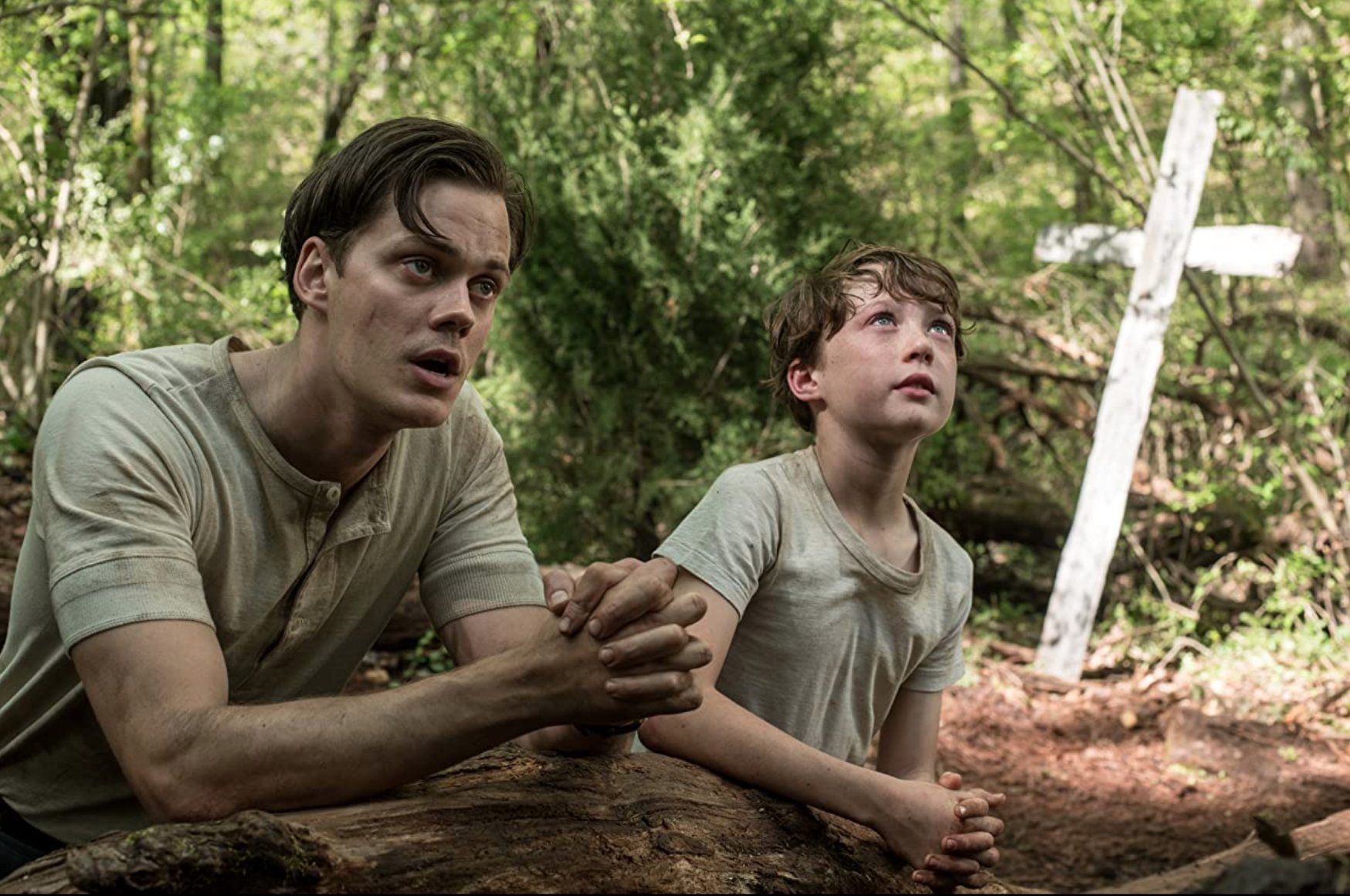Pennywise, Edward Cullen, the Winter Soldier and Spider-Man all walk into a bar: sounds like the beginning of a bad joke… or maybe just a stacked cast in a mediocre movie. The stars of The Devil All The Time (2020) are phenomenal, and the trailer was extremely compelling. The film is a sinister, multi-generational story blighted by the fallout from war and sin. However, as the 138-minute movie trudges along, it becomes disappointingly clear that, substance-wise, there simply isn’t much here.
The Devil All The Time opens with bleak piano notes and ominous, discordant violin chords accenting an otherwise chaste tune. This theme of darkness looming over piety is reflected not only throughout the score, but throughout the plot development as well. The omniscient, third-person narration provides context for disastrous situations and insight into each character’s mindset, while allowing for the occasional embellishment of dark humor. And, as a bonus, the film’s narrator is none other than Donald Ray Pollock, the author of the novel that the film is based upon. The film begins with the narrator introducing us to Willard Russell (Bill Skarsgård) during his time as a soldier and to the horrors of war that scarred him. The recurring motif of crucifixion finds its root here, and the tone is chillingly set as Willard’s unit comes across a gory scene of an unconscious crucified soldier swarmed by flies. Suddenly he awakens, gasping for air, and the camera pans out to show one of the soldiers putting him out of his misery with a single, earsplitting shot to the head.
In order to pepper in some context by way of revealing menacing secrets, the film avoids following a completely linear chronology, and thus flashes back in time for a few key instances. This strategy lays out the necessary background to shed light on Willard’s persona and his actions, which will inevitably end up defining the life of his son, Arvin (Tom Holland). The story progresses from Willard’s life after returning from the war to Arvin’s teenage years, but a tumultuous string of events ensues. Arvin’s mother Charlotte (Haley Bennett) passes away due to cancer, but this is only the first of many tragedies that occur for Arvin. Throughout the short time between her diagnosis and her death, Willard frantically prays for her to be saved; he drags Arvin to the wooden cross he has erected in the woods near their home and forces him to pray, too. The film’s exploration of the grim nuances of fanatical religious devotion and its hypocrisy is highlighted in this section of the movie; in a moment of desperation, Willard convinces himself that providing God with a sacrifice will ensure Charlotte’s recovery, so he kills Arvin’s dog, Jack, leaving Arvin devastated. When Charlotte dies anyway, Willard is overcome with grief and commits suicide, leaving Arvin an orphan.
After scrambling through Arvin’s calamitous childhood, the movie jumps backward in time to introduce us to Lenora, whom Arvin will later grow up with and love as a sister. In a flashback, we are given context into Lenora’s (Eliza Scanlen) mirrored past. Her father, Roy Laferty (Harry Melling), is a minister who believes that God has given him a message: to kill his wife Helen (Mia Wasikowska) so that he can immediately raise her back from the dead. Leaving baby Lenora with Arvin’s grandmother, Helen unknowingly sets off with Roy on what she believes will be a holiday. Unsurprisingly, the gruesome murder cannot be undone, and Roy is left in shock.
Cutting to the next set of characters, or more succinctly, sinners, the film follows Sandy and Carl Henderson (Riley Keough and Jason Clarke), a Bonnie and Clyde-esque couple who lure hitchhiking men into the woods and kill them. The duo comes across Roy, and he becomes their victim. Now Lenora, too, is an orphan like Arvin. Coincidentally, Sandy’s brother, Lee Bodecker, is the same corrupt sheriff who Arvin called upon finding his father’s body.
By and large, the film seeks to explore the entwined nature of the past and the present, and the ripple effect set off by actions of sinners ultimately shapes the fates of the two children. Arvin’s love for Lenora might be the purest aspect of the story, but not even that is left untainted. In the portion of the movie following Arvin and Lenora’s teenage years, a fresh series of abhorrent misfortune unfolds. Enter the seedy preacher, Reverend Preston Teagardin (Robert Pattinson), who preys on the young women who think him holy and his actions sincere, driving them into the woods to take advantage of them. When Lenora, who becomes one of his victims, tells him she is pregnant, he gaslights her and denies any responsibility for her situation. The pressure becomes insurmountable for Lenora, and she goes into her family’s barn to hang herself. As the seconds pass, she comes to her senses and decides not to go through with this, but it is too late. She slips from the bucket she is standing on, and unintentionally hangs herself.
This specific event is what sets an already jaded, misanthropic Arvin on the warpath, and it serves as the catalyst for the film’s hastily executed conclusion. The resolution ends up feeling forced as the different character lines begin to converge. The full-circle moment that the film ambitiously aimed to achieve was an ultimately superficial exercise, because the stakes simply felt too low. In the sluggish, choppy lead-up to the end, there was a disappointing lack of depth and character background. It seemed that there were a lot of grand elements and goals the film wanted to achieve, but never quite course-corrected and figured out how to do so. The result is a predictable and bland culmination that weakly ties up loose ends and leaves you wondering, what, if anything, was the message here? Religion, and maybe war, are the foundations of the film, and how in the midst of these violent and unruly forces, the innocent become collateral damage. However, in all the chaos of trying to stitch this message into the cluttered disarray of events, the quality of the film and connection to the characters are what inadvertently become the collateral damage.





